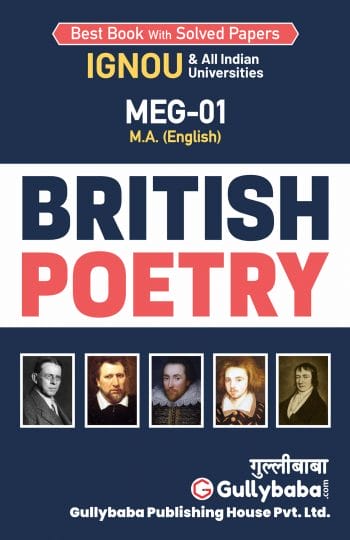IGNOU MEG-01 (July 2024 - January 2025) Assignment Questions
1. Explain any two of the excerpts of poems given below with reference to their context:
(i) Now, sire”, quod she, “When we flee fro the bemes
For Goddess love, as taak som laxative.
Up peril of my soule and o lif,
I counseille yow the beeste, I wol nat lye,
(ii) My loue is now awake out of her dreams (s),
and her fayre eyes like stars that dimmed were
With darksome cloud, now shew theyr goodly beams
More bright then Hesperus his head doth rere.
(iii) I wonder by my troth, what thou, and I
Did, till we lov’d? were we not wean’d till then?
(iv) Damn with faint praise, assent with civil leer,
And without sneering, teach the rest to sneer;
Willing to wound, and yet afraid to strike
2. Highlight the salient features of Romanticism with illustrations from the poems prescribed for study.
3. Attempt a comparison between the Epithalamion and the Prothalamion as wedding songs.
4. Would you agree that Milton reflects on blindness in Sonnets 19 & 23? Give a reasoned answer.
5. Would you consider Sylvia Plath’s Daddy to be an expression against the voice of patriarchy? Comment critically
IGNOU MEG-01 (July 2023 - January 2024) Assignment Questions
1. Explain any two of the excerpts of poems given below with reference to their context:
(i) Ye Presences of Nature, in the sky
And on the earth ! Ye Visions of the hills !
And Souls of lonely places ! can I think
A vulgar hope was yours when ye employed
Such ministry..
(ii) Tyger ! Tyger ! burning bright
In the forests of the night,
What immortal hand or eye,
Dare frame thy fearful symmetry?
(iii) My first thought was, he lied in every word,
That hoary cripple, with malicious eye
Askance to watch the workings of his lie
(iv) Dying
Is an art, like everything else.
I do it exceptionally well.
2. Discuss Chaucer's handling of the fable in 'The Nun's Priest's Tale'.
3. Consider 'The Garden' by Andrew Marvell as a didactic poem.
4. Attempt a critical appreciation of 'The Triumph of Life' by P.B. Shelley.
5. What was the Reformation? What relations can you identify and trace between the Renaissance and the Reformation.
6. Bring out the theme of 'Church Going' by Philip Larkin.
IGNOU MEG-01 (July 2022 - January 2023) Assignment Questions
1. Explain any two of the excerpts of poems given below with reference to their context:
(i) But hail thou Goddes, sage and holy,
Hail divinest Melancholy,
Whose Saintly visage is too bright
To hit the Sense of human sight;
And therefore to our weaker view,
Ore laid with black staid wisdoms hue.
(ii) My love is now awake out of her dreams (s),
and her fayre eyes like stars that dimmed were
With darksome cloud, now shew theyr goodly beams
More bright then Hesperus his head doth rere.
(ii) All human things are subject to decay,
And when Fate summons monarchs must obey.
This Fleckonoe found, who, like Augustus, young
Was called to Empire and had governed long;
(iv) Damn with faint praise, assent with civil leer,
And without sneering, teach the rest to sneer;
Willing to wound, and yet afraid to strike
2. Draw a ccomparison between the Epithalamion and the Prothalamion as wedding songs. Answer with suitable examples.
3. Who were the Pre- Raphaelites and what were the characteristics of the movement? Critically appreciate any one poem of this age/movement.
4. What attitude to Nature does Coleridge express in the Ode to Dejection? In what ways does this attitude differ from that of Wordsworth and from his own earlier attitude?
5. What was the Reformation? What relations can you identify and trace between the Renaissance and the Reformation.
6. Philip Larkin has been called an ‘uncommon poet of common man’. Would you agree? Explain with suitable examples.
Buy MEG-01 Assignment 